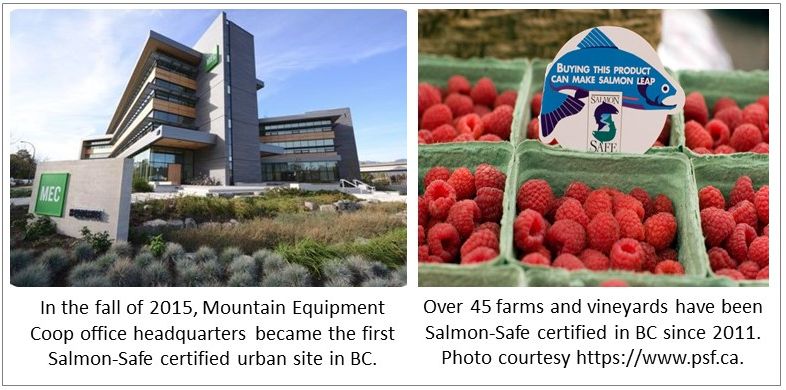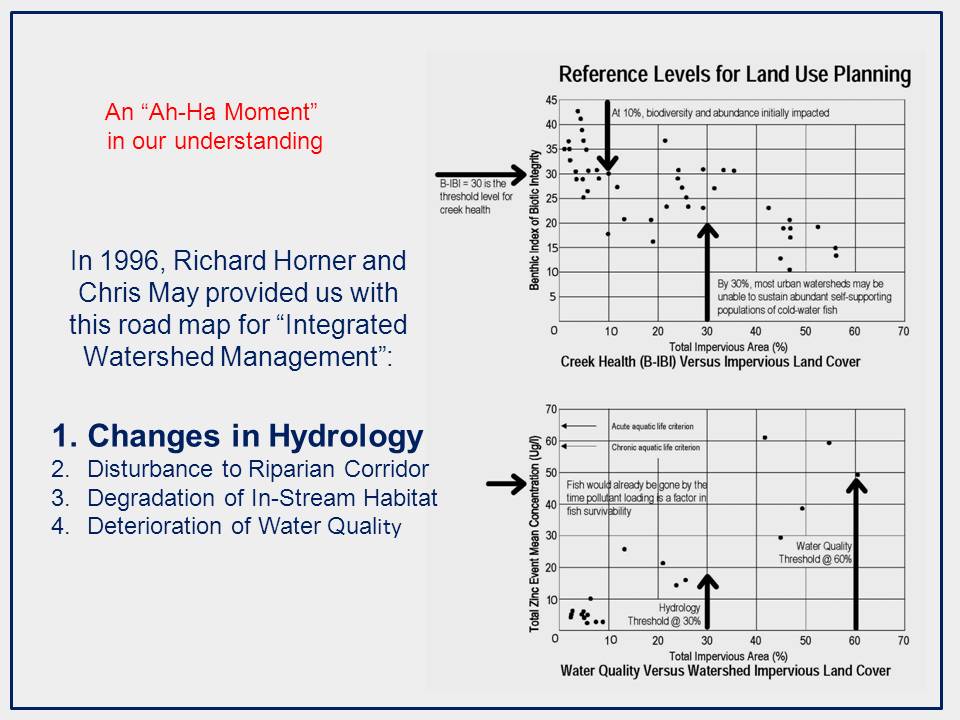Salmon-Safe BC promotes understanding and protection of the land-water connection
Note to Reader:
Salmon-Safe certification provides a seal of approval that land and water management practices implemented across the entire site protect water quality and habitat for salmon and other native species. Salmon-Safe BC is delivered in partnership by the Fraser Basin Council and the Pacific Salmon Foundation with support from Salmon-Safe Inc. in Portland, Oregon. The program was rolled out in 2011.
Eco-Logo Certification
“The Partnership for Water Sustainability community knows all too well that how we manage and develop the land matters, just like we know that our built environment is 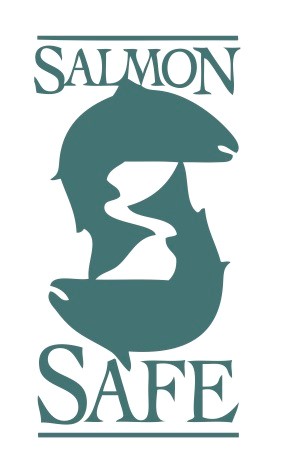 inextricably linked to the health of local watercourses and watersheds. We also know that clearly communicating the land-water interconnection to achieve more sustainable outcomes is an ongoing challenge,” states Amy Greenwood, Assistant Manager of the Watersheds and Water Resources Program at the Fraser Basin Council and program lead for Salmon-Safe BC.
inextricably linked to the health of local watercourses and watersheds. We also know that clearly communicating the land-water interconnection to achieve more sustainable outcomes is an ongoing challenge,” states Amy Greenwood, Assistant Manager of the Watersheds and Water Resources Program at the Fraser Basin Council and program lead for Salmon-Safe BC.
Amy Greenwood and Constanza Testino, a Program Manager with the Pacific Salmon Foundation, are co-leads for Salmon-Safe BC.
Identification of Opportunities for Continuous Improvement
“This communication-action challenge was one of the key reasons that Salmon-Safe certification was established in Oregon in the mid-1990s. As an eco-logo certification, Salmon-Safe promotes the land-water interconnection by recognizing progressive, 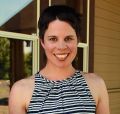 environmentally conscious management practices while identifying opportunities for continuous improvement across a wide range of urban and agricultural land uses.”
environmentally conscious management practices while identifying opportunities for continuous improvement across a wide range of urban and agricultural land uses.”
“In the public realm, Salmon-Safe certification provides a platform for local government action, leadership and recognition.”
Who has Achieved Salmon-Safe Certification?
“Salmon-Safe is now active across the entire Pacific Northwest region with more than 38,000 hectares of urban and agricultural land certified from Northern California to British Columbia. Following introduction to BC in 2011, Salmon-Safe has certified more than 45 agricultural properties and recently in 2015 certified the first urban site in BC – the Mountain Equipment Co-Op (MEC) Head Office in Vancouver,” continues Naomi Robert, Project Coordinator with the Fraser Basin Council.
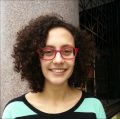 “In addition to the recently certified MEC Head Office in Vancouver, other high-profile sites that are Salmon-Safe certified include the University of Washington, the entire Portland City parks network (4,000 ha across 250 parks), Seattle Art Museum and the recently completed Allen Institute for Brain Science in Seattle. In addition, the Salmon-Safe BC team is working closely with a number of progressive property developers and land managers to assess and certify sites in the Lower Mainland.”
“In addition to the recently certified MEC Head Office in Vancouver, other high-profile sites that are Salmon-Safe certified include the University of Washington, the entire Portland City parks network (4,000 ha across 250 parks), Seattle Art Museum and the recently completed Allen Institute for Brain Science in Seattle. In addition, the Salmon-Safe BC team is working closely with a number of progressive property developers and land managers to assess and certify sites in the Lower Mainland.”
“The Salmon-Safe assessment process is comprehensive and includes a detailed site-inspection coupled with a review of site-wide management practices by an independent team of Salmon-Safe scientists, including Dr. Richard Horner, internationally renowned stormwater management expert and Carrie Foss, Integrated Pest Management expert from Washington State University.”
A Watershed is a Whole System
In 1996, Richard Horner and Chris May published a seminal paper that synthesized a decade of Puget Sound research and provided a framework for Integrated Watershed Management.
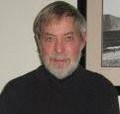 “So many studies manipulate a single variable out of context with the whole and its many additional variables,” states Dr. Richard Horner, now an adjunct professor at the University of Washington. “We, on the other hand, investigated whole systems in place, tying together measures of the landscape, stream habitat, and aquatic life.” Richard Horner founded the Center for Urban Water Resources Management in 1990.
“So many studies manipulate a single variable out of context with the whole and its many additional variables,” states Dr. Richard Horner, now an adjunct professor at the University of Washington. “We, on the other hand, investigated whole systems in place, tying together measures of the landscape, stream habitat, and aquatic life.” Richard Horner founded the Center for Urban Water Resources Management in 1990.


